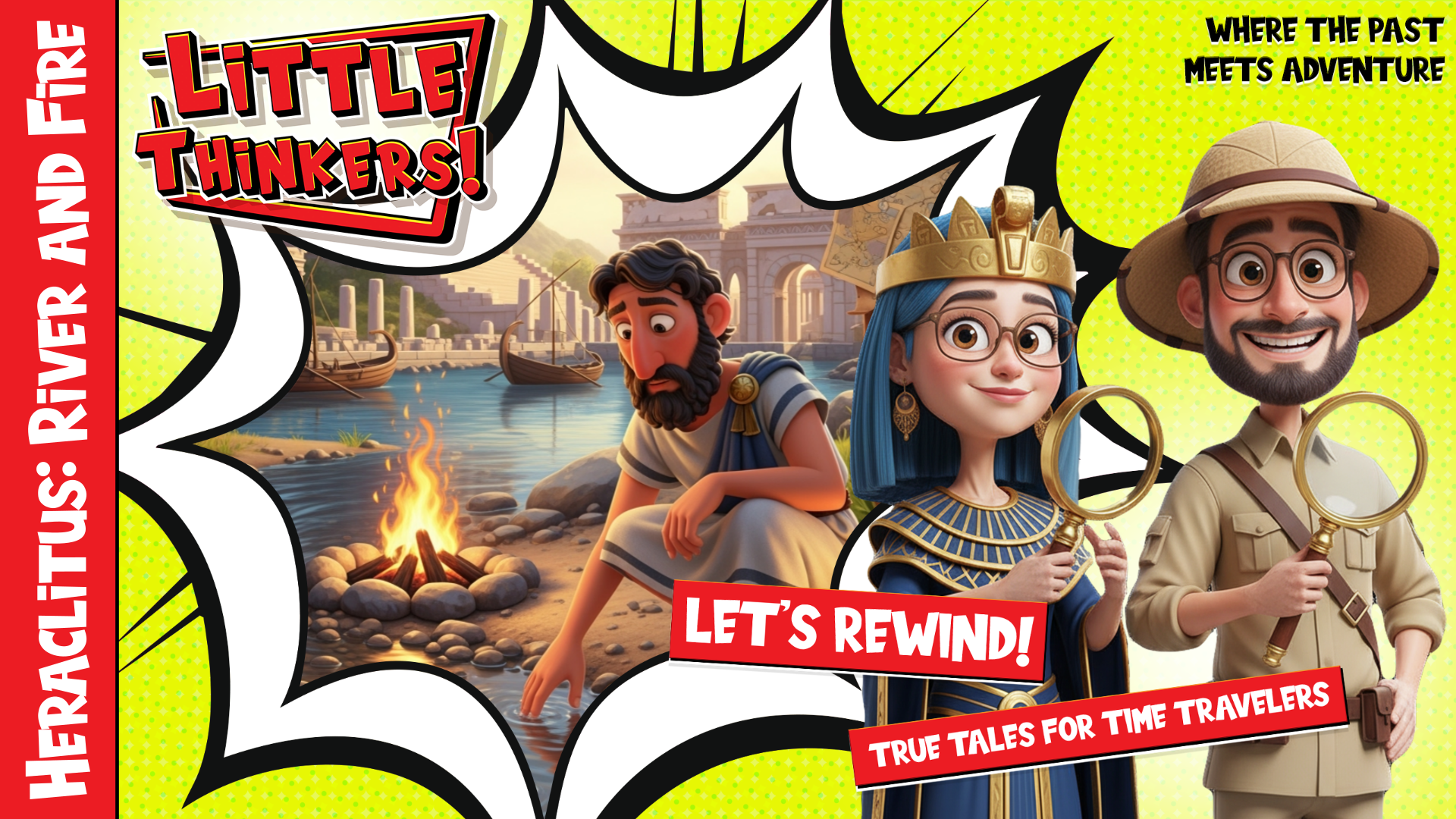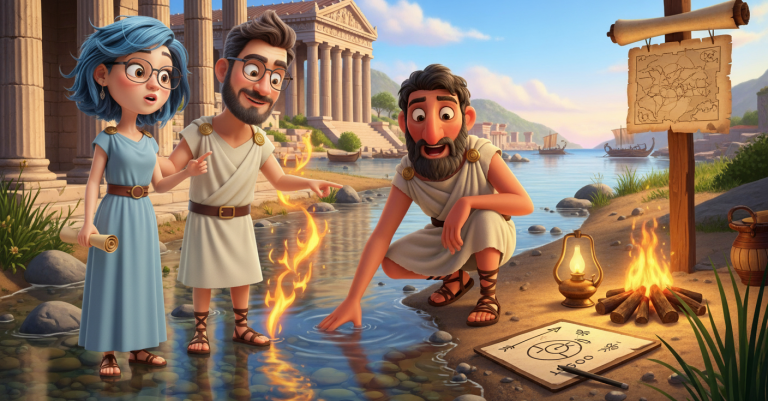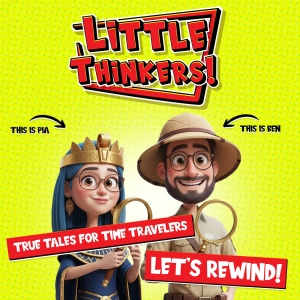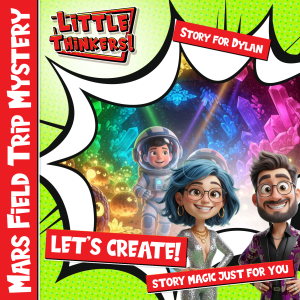The Philosopher Who Watched Rivers Flow: Heraclitus and His Amazing Ideas About Change
Imagine Walking Through an Ancient City by the Sea
Picture yourself stepping through the dusty streets of Ephesus, a bustling Greek city over 2,500 years ago! The salty sea breeze carries the calls of merchants selling olives and honey cakes. White seagulls circle overhead while wooden ships creak in the harbor. But wait—there’s someone special walking quietly through these busy streets. His name is Heraclitus, and he’s about to discover something incredible that people still talk about today!
Ben and Pia from “Let’s Rewind!” want to take us on this amazing journey back in time to meet this fascinating thinker. Are you ready to discover how watching a simple river led to one of the most important ideas in history?
Meet Heraclitus: The Deep Thinker of Ephesus
Heraclitus wasn’t like other people in his city. While everyone else rushed around buying and selling things, he preferred to walk slowly and think deeply. He came from a wealthy, respected family, but he didn’t care about showing off or being popular. Instead, he loved to study the world around him with curious, careful eyes.
Every morning, Heraclitus would put on his simple cloak and wander through Ephesus. He’d watch smoke twist from cooking fires, listen to the sounds of the harbor, and notice how everything seemed to be constantly moving and changing. But what fascinated him most was a river that flowed just outside the city walls.
Fun Fact!
Ephesus was home to the Temple of Artemis, one of the Seven Wonders of the Ancient World! It was four times larger than the famous Parthenon in Athens and took over 120 years to build. Heraclitus would have walked past this magnificent temple every day!
The River That Changed Everything
One sunny day, Heraclitus crouched by the riverbank and dipped his hand into the cool, flowing water. As he watched twigs and leaves swirl past in the current, something amazing occurred to him. The water touching his hand right now wasn’t the same water that had touched it a moment before—it was completely new water!
This gave him a brilliant idea that would make him famous forever. He wrote: “You cannot step into the same river twice.” But he didn’t just mean because the water had changed. He meant that you had changed too! Even in those few seconds, your body had grown a tiny bit, you’d learned something new, and time had moved forward. Both you and the river were completely different!
This was revolutionary thinking! Heraclitus realized that everything in the world is constantly changing, all the time. Even things that look solid and still—like rocks or buildings—are actually changing bit by bit, just very slowly.
Did You Know?
- Ancient Greeks didn’t have clocks like we do—they used sundials and water clocks!
- People in Ephesus wrote on wax tablets that could be erased and reused
- The city was so wealthy that they minted some of the world’s first coins
Fire: His Second Great Teacher
After his river discovery, Heraclitus became fascinated with fire. He would sit for hours watching flames dance in oil lamps and cooking fires. Fire was perfect for showing his ideas about change! Look at a candle flame—it keeps the same shape, but the fire itself is constantly moving, eating the wax, and creating new light.
Heraclitus believed fire was like the whole universe. Everything was constantly changing, but there was still a pattern, a rule that kept things organized. He called this invisible rule the “logos” (pronounced LOW-goss). The logos wasn’t a person or a god—it was like a secret instruction manual that kept the world running smoothly even while everything changed.
Try This at Home!
Next time you see a candle or campfire, watch it carefully for one minute. Notice how the flame moves and changes but keeps its basic shape. That’s exactly what Heraclitus was thinking about! (Always ask an adult before watching any fires, and never touch them!)
The Mystery Writer
Heraclitus had another unusual habit—he wrote in riddles! Instead of explaining his ideas in long, easy sentences, he wrote short, puzzling statements that made people think hard. For example, he wrote: “The way up and down are one and the same.” What do you think that means?
He did this on purpose! Heraclitus believed that if something was too easy to understand, people wouldn’t value it. He wanted his readers to work hard, like solving a puzzle, because then they would remember his ideas better. It was like hiding treasure—only people who dug carefully would find the gold!
Legend says he put his book of riddles in the great Temple of Artemis as a gift to his city. Imagine finding that mysterious scroll among all the temple offerings!
Life Back Then
In ancient Ephesus, people didn’t have books like we do. Instead, they wrote on long strips of papyrus (made from plants) that rolled up into scrolls. Libraries were rare and precious. Most people couldn’t read, so important ideas were often shared by speaking them out loud in the marketplace!
Why People Called Him “The Weeping Philosopher”
Here’s something sad but important: Heraclitus often felt frustrated because he thought people weren’t paying attention to wisdom and truth. He would stand at the edge of festivals, watching people have fun, but feeling heavy-hearted because they seemed to ignore the important things in life.
Later generations nicknamed him “the weeping philosopher” because his ideas sounded serious and stern. But this doesn’t mean he cried all the time! He just cared deeply about helping people think better and make wiser choices. It’s like when a teacher seems strict because they want you to learn something really important.
Heraclitus believed that most people were “asleep while awake”—they went through life without really noticing the amazing patterns and changes happening all around them. He wanted to wake them up with his words!
Amazing Fact!
Ancient Greek philosophers often had nicknames! Plato’s real name was Aristocles—”Plato” meant “broad” because he had wide shoulders. Democritus was called “the laughing philosopher” because people said he found human behavior amusing rather than sad like Heraclitus.
Opposites Need Each Other
Heraclitus made another brilliant discovery: opposites actually need each other! He noticed that you can’t have “up” without “down,” or “hot” without “cold,” or “day” without “night.” They’re like dance partners—they seem opposite, but they actually work together to make sense.
He loved to watch boys playing with knucklebones (an ancient game like jacks) near the temple steps. He also studied how a bow works—you have to pull the string and the wood in opposite directions to make the arrow fly straight. The tension between opposites creates something new and powerful!
This idea was revolutionary! Most people thought opposites were enemies that fought each other. But Heraclitus showed that they were actually partners in creating the world’s patterns.
Think About It!
Can you think of opposites in your own life that actually help each other? Here’s a hint: What about work and rest? Or learning and playing? How do they balance each other out?
The Mysterious End
As Heraclitus grew older, he became ill with something ancient doctors called “dropsy”—his body retained too much water, making him feel heavy and tired. Even then, he kept asking questions and thinking about nature’s patterns.
Here’s where history gets strange! Some ancient writers told wild stories about how Heraclitus tried to cure himself. They said he covered himself with cow dung and lay in the sun, hoping to draw out the extra water from his body. But modern historians think these stories were probably made up—people in ancient times sometimes invented dramatic tales about famous people.
What we do know is that Heraclitus died from his illness, but his ideas lived on. Sometimes the most important part of a person’s life isn’t how it ends, but what they leave behind for others to discover.
Historian’s Note
When studying ancient history, we have to be careful about separating facts from legends. Ancient writers sometimes mixed real events with made-up stories to make their tales more exciting. Good historians always try to figure out what really happened!
His Ideas Keep Flowing Like a River
Even though Heraclitus died over 2,400 years ago, his ideas never stopped flowing! Students copied his mysterious sayings onto wax tablets and papyrus scrolls. They passed them to friends in other cities. Teachers argued about what the riddles meant, and that arguing helped spread the ideas even further.
Later philosophers like the Stoics loved Heraclitus’s ideas about the logos—the hidden order in the world. Roman thinkers studied his writings. When Christianity spread, some early Christian thinkers found connections between the logos and their own beliefs about divine wisdom.
During the Renaissance (about 500 years ago), European scholars rediscovered ancient Greek texts and fell in love with Heraclitus all over again. Artists even painted pictures showing Heraclitus looking sad next to Democritus (another philosopher) looking happy, representing two different ways of viewing life.
Incredible Connection!
The word “logic” that we use today comes from Heraclitus’s word “logos”! Every time you solve a math problem or figure out a puzzle using logical thinking, you’re using an idea that started with this ancient Greek philosopher watching rivers flow.
Modern Scientists Agree with Heraclitus!
Here’s something amazing: modern science has proven that Heraclitus was right about change! Scientists now know that even the most solid-looking things are constantly changing. The atoms in your body are buzzing around at incredible speeds. The cells in your skin replace themselves completely every few weeks. Even mountains and rocks change over time!
Physicists study something called “thermodynamics,” which is basically the science of how energy flows and changes—just like Heraclitus’s flowing river! Biologists know that living things only stay alive by constantly changing and growing. Astronomers see that stars, planets, and galaxies are all moving and changing through space.
Heraclitus couldn’t see atoms or cells or distant galaxies, but somehow he figured out one of the universe’s most important secrets just by watching carefully and thinking deeply.
Science Fun Fact!
Every seven years, almost every cell in your body has been replaced with new ones. So in a very real way, you’re like Heraclitus’s river—you’re constantly changing while still being you! Your body today is made of completely different material than your body seven years ago.
Visiting Ephesus Today
If you visit Turkey today, you can walk through the ruins of ancient Ephesus! The city is now a famous archaeological site where tourists from around the world come to see where Heraclitus once lived and thought. You can see the remains of the great theater, the library, and even foundations of the Temple of Artemis.
The harbor where ships once brought goods from across the Mediterranean is now filled with soil—even the geography changed over time, just like Heraclitus predicted! The river he studied probably changed course long ago. But visitors still feel the magic of walking where one of history’s greatest thinkers once puzzled over the mysteries of change and flow.
Travel Tip!
The modern town near ancient Ephesus is called Selçuk. If your family ever visits Turkey, you can see where Heraclitus lived! The ruins are incredibly well-preserved, and you can even see ancient graffiti on some walls—proof that people have always liked to leave their mark!
What We Can Learn from the River-Watcher
Heraclitus teaches us that change isn’t something to fear—it’s the most natural thing in the world! Instead of being upset when things change, we can learn to notice the patterns and flows around us. Every day brings new opportunities to grow, learn, and become better versions of ourselves.
He also shows us the power of asking good questions and thinking carefully about what we observe. Heraclitus didn’t have fancy equipment or computers, but he had something even more powerful: curiosity and patience. He watched rivers and fires until he understood something profound about how the whole universe works.
Most importantly, Heraclitus reminds us that wisdom often comes in small packages. His short, puzzling sayings have inspired people for over two thousand years. Sometimes the most powerful ideas can fit in just a few words—if those words are chosen carefully!
Your Turn to Be a Philosopher!
Try this: Pick something in nature to observe for five minutes—a tree, clouds, a stream, or even ants walking. What patterns do you notice? How do things change while you watch? What questions does your observation raise? You’re thinking like Heraclitus!
The Flame That Never Goes Out
As we finish our journey back to ancient Ephesus, remember that Heraclitus’s ideas are like the fires he loved to study—they keep burning and giving light to new generations. Every time you notice how things change and flow around you, every time you ask deep questions about the world, every time you work hard to understand something difficult, you’re carrying on the tradition that started with a quiet man watching a river flow.
The “weeping philosopher” wasn’t really sad—he was deeply caring. He wanted people to wake up and pay attention to the incredible, constantly changing world we all share. His river keeps flowing, his fire keeps burning, and his questions keep inspiring curious minds everywhere.
So the next time you see a river, a candle flame, or even just watch clouds drift across the sky, remember Heraclitus. He showed us that if we look carefully and think deeply, the whole universe becomes our teacher. And that’s a lesson that will never grow old, no matter how much the world keeps changing around us!













